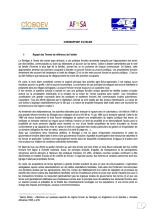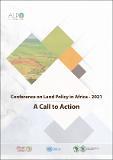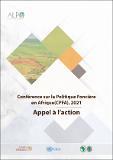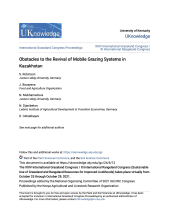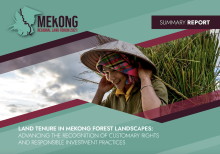Land Library Search
Through our robust search engine, you can search for any item of the over 73,000 highly curated resources in the Land Library.
If you would like to find an overview of what is possible, feel free to peruse the Search Guide.
/ library resources
Showing items 1 through 9 of 15.Au demeurant, bien accompagner et appuyer les communautés locales dans la défense de leurs droits fonciers suppose une bonne connaissance des mécanismes nationaux et supranationaux de protection des droits fonciers des communautés.
The African Land Policy Centre (ALPC), a joint initiative of the African Union Commission (AUC), the United Nations Economic Commission for Africa (ECA), and the African Development Bank (AfDB) biennially convenes the only African, multi-stakeholder conference on land policy in Africa.
Le Centre africain pour les politiques foncières, qui procède d’une initiative conjointe de la Commission de l’Union africaine (CUA), de la Commission économique pour l’Afrique (CEA) et de la Banque africaine de développement (BAD), organise tous les deux ans la seule conférence africaine multipa
Land and ecosystems lay the foundation of the economy and the wellbeing of society. 85 percent of the world’s 1.2 billion young people live in regions that are directly dependent on land and natural resources for sustenance.
This paper focuses on mitigating strategies public infrastructures. It's comprises of fours (4) parts. The first part is the background/introduction that gives a comprehensive summary of the topic.
Livestock mobility was an essential characteristic of Kazakh livestock production systems, allowing animals to take advantage of spatial and temporal variability in climate and vegetation, optimising forage intake over the year. These systems broke down following the end of the Soviet Union.
This proceeding documents the process and outcome of the first Multi-Stakeholder Dialogue (MSD) Forum on Responsible Governance of Investment in Land (RGIL) aimed at ensuring investment in land in Ethiopia are productive, contribute to sustainable land management and respects the rights and needs
Recién con la Constitución de 1920 las comunidades lograron su reconocimiento por el Estado peruano, iniciándose la protección de sus tierras para frenar el apetito de los hacendados criollos, régimen que cambió drásticamente en 1993.
The Summary Report of the 3rd Mekong Regional Land Forum provides a comprehensive review of the key messages from the event including a synthesis of keynote speeches, key take-aways, the links to all presentations and additional documentation.

